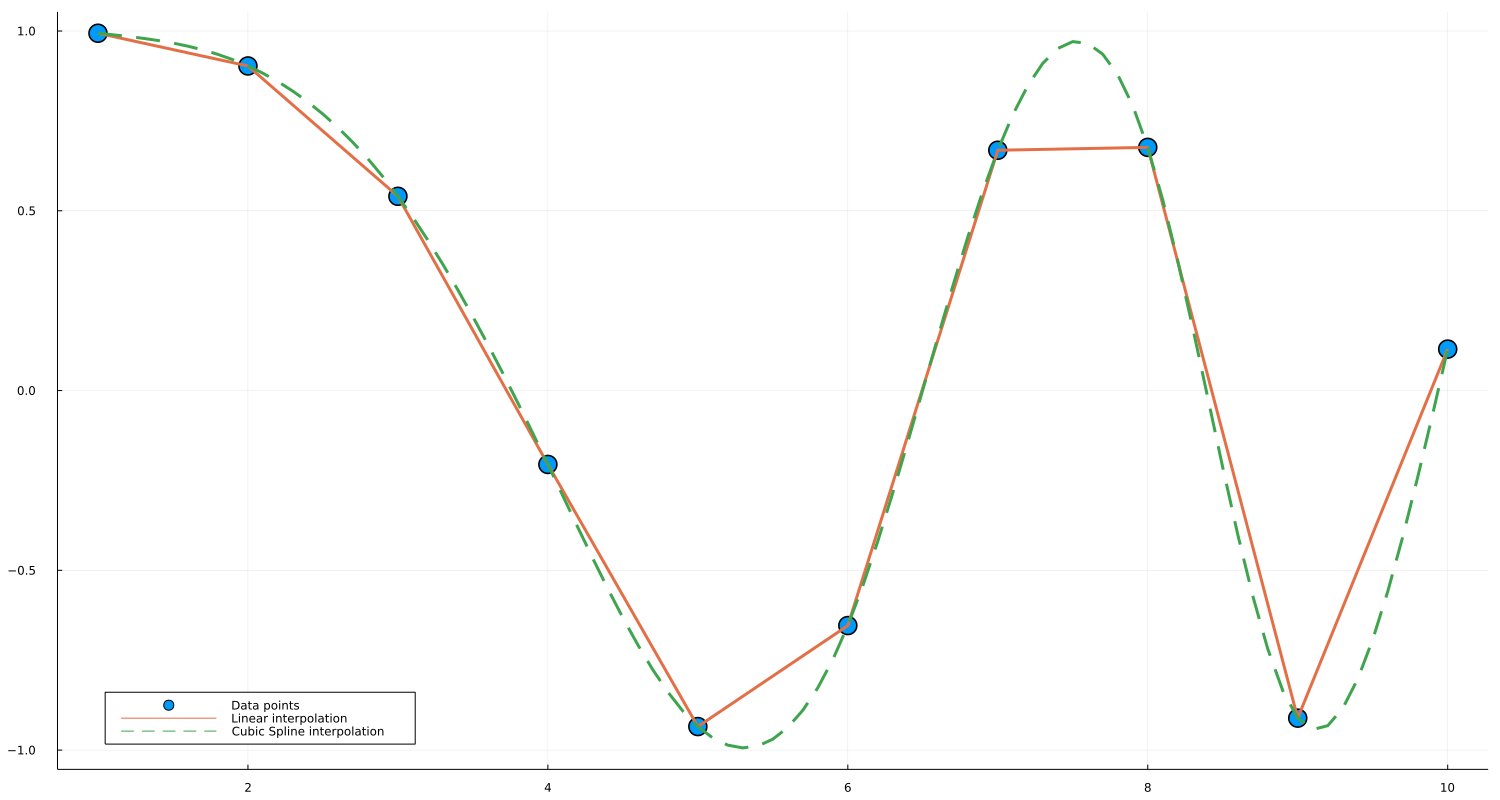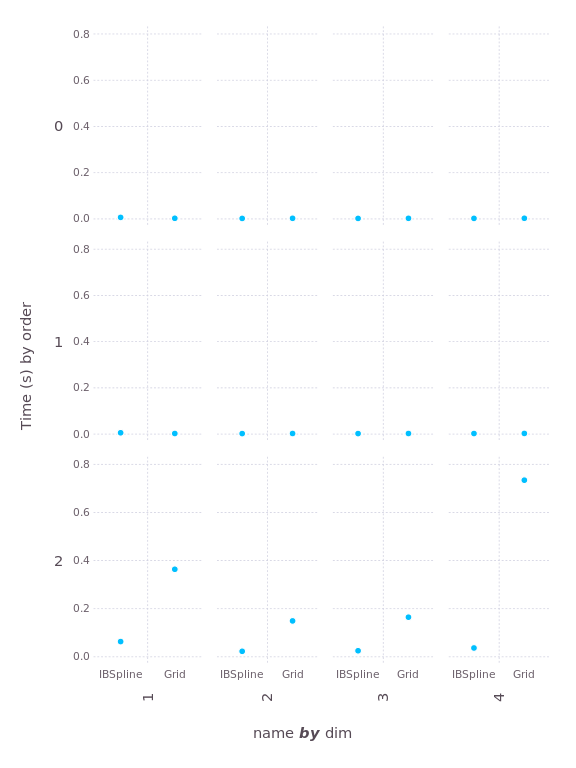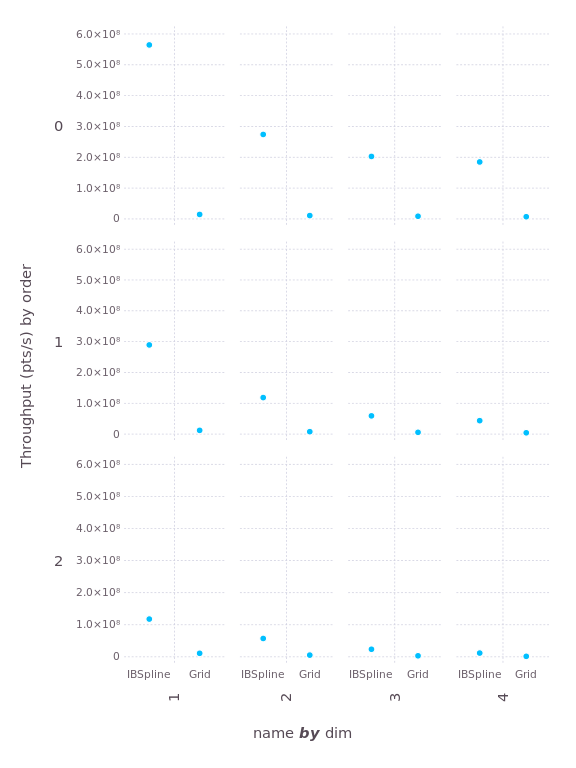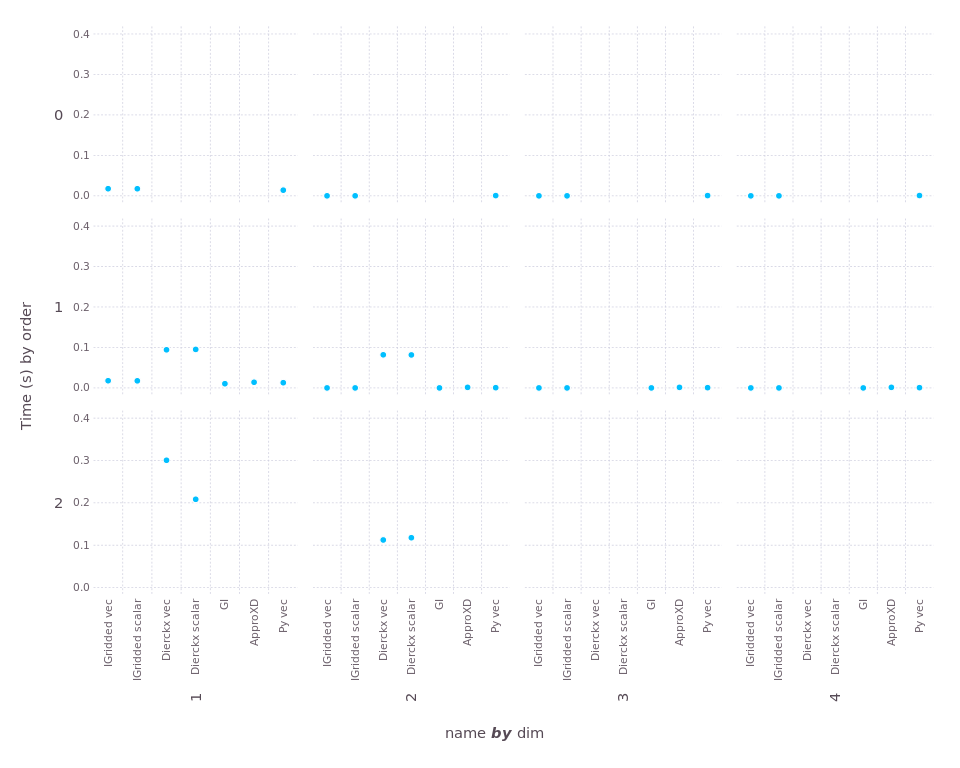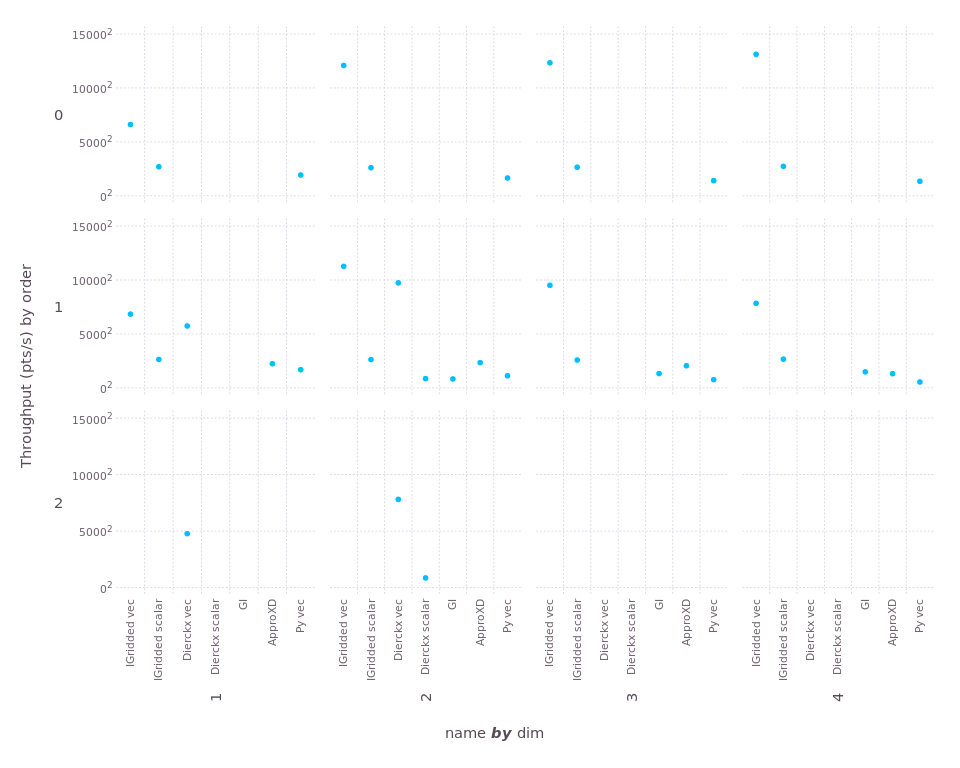This package implements a variety of interpolation schemes for the Julia language. It has the goals of ease-of-use, broad algorithmic support, and exceptional performance.
Currently this package supports B-splines and also irregular grids. The API has been designed with intent to support more options. Initial support for Lanczos interpolation was recently added. Pull-requests are more than welcome! It should be noted that the API may continue to evolve over time.
At the bottom of this page, you can find a "performance shootout"
among these methods (as well as SciPy's RegularGridInterpolator).
Interpolations.jl can be installed via the following invocation since it is a registered Julia package.
using Pkg
Pkg.add("Interpolations")Create a grid xs and an array A of values to be interpolated
xs = 1:0.2:5
A = log.(xs)Create linear interpolation object without extrapolation
interp_linear = linear_interpolation(xs, A)
interp_linear(3) # exactly log(3)
interp_linear(3.1) # approximately log(3.1)
interp_linear(0.9) # outside grid: errorCreate linear interpolation object with extrapolation
interp_linear_extrap = linear_interpolation(xs, A,extrapolation_bc=Line())
interp_linear_extrap(0.9) # outside grid: linear extrapolationMore examples, such as plotting and cubic interpolation, can be found at the convenience constructions documentation.
Other interpolation packages for Julia include:
- ApproXD.jl implements B-spline and linear interpolation in Julia.
- BarycentricInterpolation.jl implements the Barycentric formula for polynomial interpolation on equispaced points and Chebyshev points of the first and second kind.
- BasicInterpolators.jl provides a collection of common interpolation recipes for basic applications.
- BSplineKit.jl offers tools for B-spline based Galerkin and collocation methods, including for interpolation and approximation.
- Curves.jl supports log-interpolation via immutable
Curveobjects. - DataInterpolations.jl is a library for performing interpolations of one-dimensional data.
- Dierckx.jl is a wrapper for the dierckx Fortran library, which also underlies
scipy.interpolate. - DIVAnd.jl for N-dimensional smoothing interpolation.
- FastChebInterp.jl does fast multidimensional Chebyshev interpolation on a hypercube using separable grid of interpolation points.
- FEMBasis.jl contains interpolation routines for standard finite element function spaces.
- FineShift.jl does fast sub-sample shifting of multidimensional arrays.
- FourierTools.jl includes sinc interpolation for up and down sampling.
- GeoStats.jl provides interpolation and simulation methods over complex 2D and 3D meshes.
- GridInterpolations.jl performs multivariate interpolation on a rectilinear grid.
- InterpolationKernels.jl provides a library of interpolation kernels.
- KissSmoothing.jl implements denoising and a Radial Basis Function estimation procedure.
- LinearInterpolations.jl allows for interpolation using weighted averages allowing probability distributions, rotations, and other Lie groups to be interpolated.
- LinearInterpolators.jl provides linear interpolation methods for Julia based on InterpolationKernels.jl, above.
- LocalFunctionApproximation.jl provides local function approximators that interpolates a scalar-valued function across a vector space.
- NaturalNeighbours.jl provides natural neighbour interpolation methods for scattered two-dimensional point sets, with support for derivative generation.
- PCHIPInterpolation.jl for monotonic interpolation.
- PiecewiseLinearApprox.jl performs piecewise linear interpolation over an arbitrary number of dimensions.
- ScatteredInterpolation.jl interpolates scattered data in arbitrary dimensions.
Some of these packages support methods that Interpolations does not,
so if you can't find what you need here, check one of them or submit a
pull request here.
If you would like to list a registered package that is related to interpolation, please create a Github issue.
In the perf directory, you can find a script that tests
interpolation with several different packages. We consider
interpolation in 1, 2, 3, and 4 dimensions, with orders 0
(Constant), 1 (Linear), and 2 (Quadratic). Methods include
Interpolations BSpline (IBSpline) and Gridded (IGridded),
methods from the Grid.jl
package, methods from the
Dierckx.jl package, methods
from the
GridInterpolations.jl
package (GI), methods from the
ApproXD.jl package, and
methods from SciPy's RegularGridInterpolator accessed via PyCall
(Py). All methods
are tested using an Array with approximately 10^6 elements, and
the interpolation task is simply to visit each grid point.
First, let's look at the two B-spline algorithms, IBspline and
Grid. Here's a plot of the "construction time," the amount of time
it takes to initialize an interpolation object (smaller is better):
The construction time is negligible until you get to second order (quadratic); that's because quadratic is the lowest order requiring the solution of tridiagonal systems upon construction. The solvers used by Interpolations are much faster than the approach taken in Grid.
Now let's examine the interpolation performance. Here we'll measure "throughput", the number of interpolations performed per second (larger is better):
Once again, Interpolations wins on every test, by a factor that ranges from 7 to 13.
Now let's look at the "gridded" methods that allow irregular spacing
along each axis. For some of these, we compare interpolation performance in
both "vectorized" form itp[xvector, yvector] and in "scalar" form
for y in yvector, x in xvector; val = itp[x,y]; end.
First, construction time (smaller is better):
Missing dots indicate cases that were not tested, or not supported by the package. (For construction, differences between "vec" and "scalar" are just noise, since no interpolation is performed during construction.) The only package that takes appreciable construction time is Dierckx.
And here's "throughput" (larger is better). To ensure we can see the wide range of scales, here we use "square-root" scaling of the y-axis:
For 1d, the "Dierckx scalar" and "GI" tests were interrupted because they ran more than 20 seconds (far longer than any other test). Both performed much better in 2d, interestingly. You can see that Interpolations wins in every case, sometimes by a very large margin.
This package is being maintained but not actively developed. Maintenance is focused on fixing bugs and issues with the current code base. New features are welcome via pull requests and will be reviewed and released in a timely fashion.
If you would like to become involved in maintenance or active development of the package please feel free to get in touch via a Github issue.
This package follows semantic version in that documented features should not break without changing the minor version.
See the news for details on how to update between breaking releases, indicated by changes in minor versions.
Work is very much in progress, but help is always welcome. If you want to help out but don't know where to start, take a look at issue #5 - our feature wishlist =) There is also some developer documentation that may help you understand how things work internally.
Contributions in any form are appreciated, but the best pull requests come with tests!


